#sturmbannführer
Explore tagged Tumblr posts
Text
Imagine Sturmbannführer Dieter Hellstrom in the Wolfenstein universe.









#dieter hellstrom#august diehl#reichblr#ai#inglourious basterds#wolfenstein#wolfenstein new colossus#kommandant gruber#wolfenstein 2#multiverse#sturmbannführer#strawberry milkshake#ai generated
362 notes
·
View notes
Text
Real quick, did we all collectively hallucinate that Dieter was a Major when in actuality hes a Lieutenant colonel or did Inglorious Basterds itself get the ranking wrong?
Like


#dieter hellstrom#inglorious basterds (2009)#inglourious basterds#inglorious basterds#raises brow#???#EDIT : HES BEEN A STURMBANNFÜHRER THIS ENTIRE TIME????#I WAS SO CERTAIN HE WAS AN OBERSTURMBANNFÜHRER WHAT THE FUCK
10 notes
·
View notes
Text
Well, I finally got around to doing these! It's a little long – and some of my takes may be unpopular – but these are still my headcanons🤷🏻♀️ (Had to make a few minor edits to 'em now that I'm properly awake, though.) So without further ado, buckle up and take a peek under the cut!
The Germans
Schultz:
1) Is definitely not a Nazi! Cases can be made for him being both neutral and pro-Allied, but I like to think of him as neutral. He isn't a man who's into politics or anything like that, he just wants his toy factory back.
2) Low-key thinks of Hogan and his team as additional nephews, so does his best to be somewhat responsible while still being the fun uncle.
3) Has privately asked Hogan off screen to make sure he, his family and Klink aren't blamed and/or arrested for crimes they didn't commit after the war. Schultz doesn't think that would happen...but given everything that went down after World War I with the Treaty of Versailles, he isn't taking any chances.
______
Hochstetter:
1) Is a hardcore, unapologetic Nazi who hates the Geneva Convention's very existence. Only tolerates it because of Klink's insistence that his prisoners be treated humanely, and despite the disrespect he shows the kommandant, Hochstetter is aware he's outranked.
2) Has gotten to the point where he's obsessed about Hogan more than a teenager with a celebrity crush. Like, he's just a legitimate stalker at this point🤣 Hochstetter is determined to prove Hogan is Papa Bear at any cost, if for no other reason then so his superiors will stop assuming he's not mentally all the way there.
3) Is very good at his job, surprisingly enough! Hochstetter makes a damned fine detective when he's not dealing with anything involving - or potentially involving - Stalag 13. Fortunately for the boys, he tends to let his hatred and obsession with Hogan blind him to a lot of things, resulting in him dropping the ball on more than one occasion. (Most notably, the episode with Group Captain Roberts.) Of course, Hogan being able to play him like a fiddle doesn't help Hochstetter's case either.
______
Gertrude Linkmeyer:
1) Knows in her heart of hearts that her husband Otto is probably dead. As Burkhalter once told her, that's usually what 'missing in action' at the Russian Front means. But Gertrude won't ever admit that out loud because as long as she keeps denying it, she can hold on to the fragile hope that he might still be alive. Is still internally grieving for him nonetheless, though.
2) Contrary to popular belief, doesn't actually want a romantic relationship with Klink. She likes him and thinks he's cute, but she's mature enough to know you need more than that to be happy in a relationship. However, Gertrude is going along with her brother's attempts to force the pair into marriage for two reasons.
She can see Klink appears to be somewhat naïve in a few ways, and she wants to protect him from women who would use him...of which there have been a few. As stated above, Gertrude genuinely does like him as a person in his own right, so she figures a platonic marriage of convenience would be the best way to accomplish that goal. (He would also be much safer too - nobody in their right mind is gonna risk Burkhalter raining his wrath down on them because they messed with his sister's husband.) But Klink keeps pushing her away because he doesn't realize what she's trying to do. It's very much a 'I'm trying to help you here, dummkopf!' kinda vibe.
Gertrude knows Burkhalter (supposedly) barely tolerates Klink, and it baffles her as to why he would constantly try to shove them together at all in that case. The tension alone would make the holidays a living hell. But she says nothing, choosing to obey his wishes like a dutiful sister should. Gertrude is smart enough to see the grave error in judgment Burkhalter's made for himself; she's just waiting for her brother to figure it out after it's too late so she can have the last laugh.
3) Actively 'wears Burkhalter's rank' (aka uses the 'My brother is a general' card) to get things done if she really wants to. Has also used her relationship with Burkhalter behind the scenes to keep him from sending Klink off to the Front on several occasions for the reasons listed above.
******
The POWs/Allies
Kinch:
1) Is the majority brain cell holder, and therefore the only one who has a hope in hell of stopping Hogan when he gets on a roll.
2) Is on a first-name basis with Hogan in private because the two of them are friends. Nevertheless, Kinch only uses that privilege when he really needs to get Hogan's attention...usually for something critical.
3) Is utterly fascinated by all types of communicative technology. Radios, telephones, TVs...you name it, Kinch is interested in learning more about how it works.
______
LeBeau:
1) Is a mother hen whenever anyone is sick - especially Newkirk and Hogan - because he knows they don't take proper care of themselves. Will deliberately wait until Newkirk is too sick to protest, then shove foods that are extra French down his throat as part of their friendly ongoing French-English rivalry.
2) Is perpetually miffed by Hogan's blatant refusal to let him and Newkirk go on Nazi-killing sprees. Legitimately wonders if Hogan has actually lost his mind on occasion as well.
3) Gets frustrated sometimes because he doesn't understand all the references (such as sayings, terms, etc) to American culture in the barracks. Relies heavily on Kinch (and to an extent, Hogan) to explain them to him.
______
Newkirk:
1) Hates any and all authority figures with a passion, due to having had all of them treat him like dirt because he's poor. Hogan is the one exception to that rule - Newkirk would do anything for his CO if asked. He appreciates how Hogan sees him as a person and values him for his skills, as opposed to his financial status.
2) Will never admit it out loud, but is a serious worrywart, especially when it comes to Carter or LeBeau.
3) Would rather die than ever admit he needs help. Newkirk was raised to believe every bit of help comes with a price, which is why he's extremely hesitant to ever ask for even the smallest thing.
______
Wilson:
1) Dearly wishes Hogan would give him some advance warning whenever the team goes out on missions so he can go to bed earlier. That would be much appreciated, considering he often gets dragged out of bed to patch up one or more of them at all hours of the night. It's one of the reasons he's a grumpy, salty medic. (The other part is because everyone always gives him lip and he's sick of it.) He's trying to help them stay healthy; the least they could do is be grateful!
2) Would absolutely sedate Newkirk and/or Hogan - and in his CO's case, has threatened to do so more than once - if need be. Literally keeps two small containers of makeshift anesthesia he had Carter whip up set aside with Hogan and Newkirk's names on it, just in case.
3) Has zero qualms about taking advantage of the fact that a medic's orders override anyone else's, including Hogan's. Every time the colonel gets sick, the two go through a similar song and dance.
Hogan insists he's "perfectly fine" (even if he sounds like death warmed over) and tries to leave to take care of his men.
Wilson tells him to stay put.
Hogan declines and says he's leaving.
Wilson tells him to stay put again, followed by threatening to have Schultz hold him down on the infirmary bed while he (Wilson) ties him to it.
Hogan indignantly squawks something to the effect of, "You wouldn't dare!"
Wilson - who has an evil little smile on his face by this point - replies, "With all due respect, sir, try me. Either you can willingly stay put until I clear you to leave, or you'll be doing it involuntarily. Medic's orders. So, what's it gonna be, Colonel?"
Hogan reluctantly gives in.
Wilson chalks up another win, all while questioning his life choices and mentally bemoaning the fact he has the world's worst patient for a commanding officer.
______
Crittendon:
1) Isn't as stupid as he appears to be. Didn't buy his rank - that would imply he's not talented enough to earn it on his own, and he would see that as an insult. Even if he had, Crittendon would be hard-pressed to keep it if he was truly that big a screw up. Nepotism only gets you so far. Plays the fool on purpose so people will let their guard down around him, thereby enabling him to make multiple escape attempts. Unfortunately, he's pretty lousy at escapes, so he always gets recaptured.
2) Genuinely means well, but still manages to mess things up. Part of it is because he's too into his role of the idiot officer; the other part of it is being easily distracted. Has deliberately interfered with Hogan's plans more than once as well. Crittendon is a veteran of WWI, so he feels he's the only one of the POWs who knows how to fight a war properly. He sees it as his duty to educate them how things should be done.
3) Was still mentally stuck in WWI the first time he was captured. At some point between his transfer out of Stalag 13 and his next appearance there, Crittendon realized the Nazis have no honor, and that the rules of WWI have all but been chucked out the window. This explains why he did a 180° shift in attitude regarding Hogan's operation. Went from a 'Oh dear, you poor, misguided Yank...you really have no clue how to fight a war properly, do you? Let me teach you how the game is played' vibe to a 'Right, Jerry may not have any honor now, but I still know better than you, old boy. More war experience and all that, wot wot?' one.
______
Marya:
1) Is, essentially, the female version of Hogan. She's just as smart as he is. But in a era where a woman's opinion holds less weight, she has to get creative with her scheming. Plus, Marya likes keeping Hogan on his toes. Not only does it ensure her wits stay sharp, it gives her great joy to frustrate him to no end solely for the entertainment value.
2) Also enjoys making over-complicated plans, same as Hogan does. Sure, she could level with him about what she wants to do from the start, but where's the fun in that?😂 She wouldn't tell him everything anyway; she's smart enough to know you should never put all your eggs in one basket. Marya is well aware Hogan is a great leader, but she also knows firsthand from life in the USSR that even the strongest leaders can fall, and she doesn't want to be caught in the backlash if that happens.
3) Is hardcore crushing on Hogan. (Can't blame her for that; he is very handsome.) Tries to let him know - and thereby enable him to make the first move - by flirting with him constantly. When that doesn't work, Marya begins doing the same thing with LeBeau, trying to make Hogan jealous enough to kiss her and mark her as his woman...which eventually works. Persistence for the win!
The rest of my headcanons about Schultz and Newkirk can be found on this document, along with my ones of Klink, Burkhalter, Hogan and Carter.
Also, if anyone is interested, I did write out Klink’s experiences in both wars here. It's told via flashback, however, which is why it abruptly jumps from World War I to World War II despite being in story format.
What are your top 3 headcanons for Hogan's Heroes in general?
What are your top 3 headcanons for each character?
#hogan's heroes#Oberfeldwebel Schultz#sergeant schultz#hans schultz#Sturmbannführer Hochstetter#major hochstetter#wolfgang hochstetter#frau linkmeyer#gertrude linkmeyer#sergeant kinchloe#james kinchloe#corporal lebeau#louis lebeau#corporal newkirk#peter newkirk#sergeant wilson#joe wilson#group captain crittendon#colonel crittendon#rodney crittendon#my headcanons#long post
50 notes
·
View notes
Text

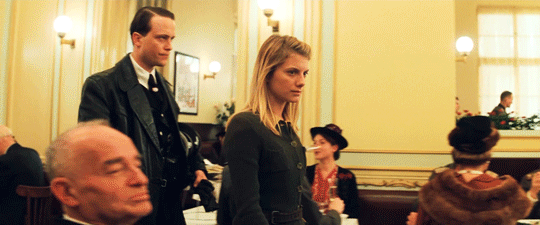

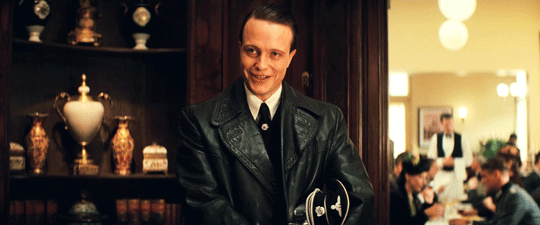
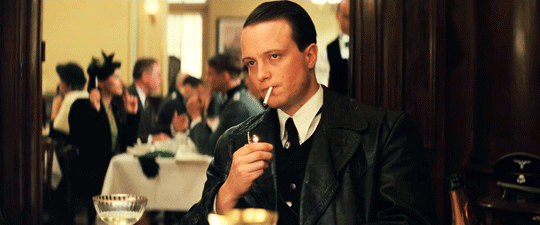
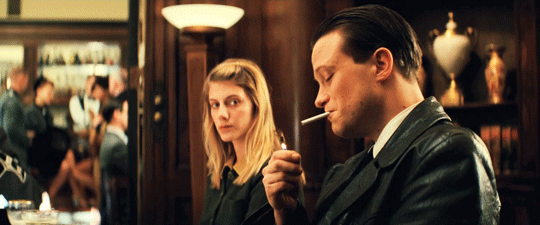
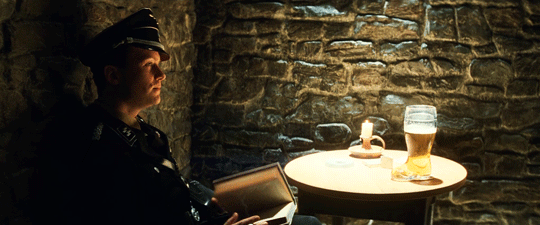

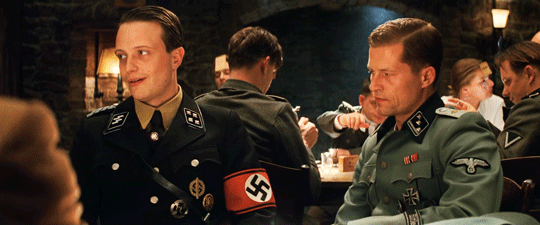
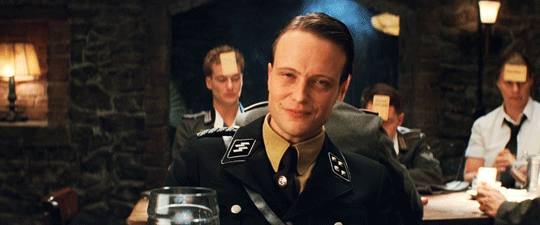
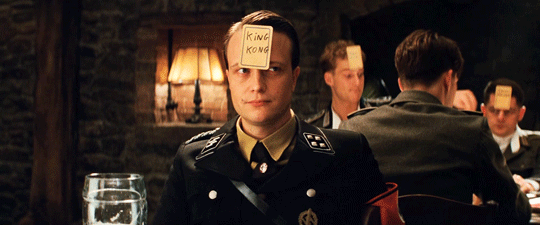


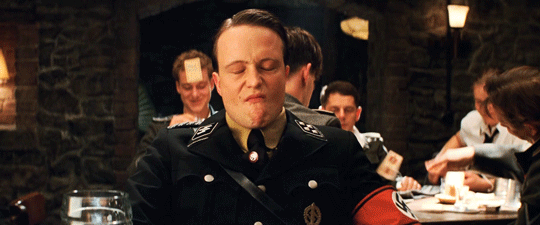
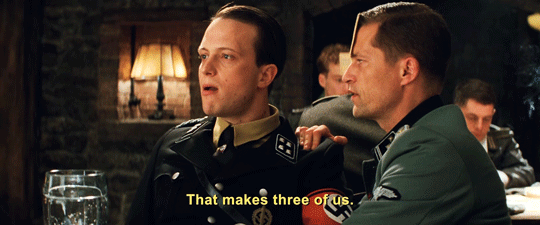

AUGUST DIEHL as Sturmbannführer Dieter Hellstrom in Inglorious Basterds (2009) | dir. Quentin Tarantino
#dieter hellstrom#inglourious basterds#quentin tarantino#august diehl#filmgifs#augustdiehledit#filmedit#filmtvcentral#dailyfilmsource#dailyflicks#cinemapix#cinematv#usersource#coppoladelreygifs
552 notes
·
View notes
Text



Max Hansen
31st July 1908 - 7th March 1990
• He was born on 31st July 1908 at Niebüll, Germany. Before joining the SS, he was a locksmith apprentice
• In 1933, he joined the SS-Verfügungstruppe and, by 1939, was the commander of the 12th Company in the Leibstandarte SS Adolf Hitler In 1941, he was awarded the German Cross in Gold and promoted to Sturmbannführer (Major). He was given command of the II 1st Panzer Grenadier Regiment.
• It was whilst commanding this battalion during the Third Battle of Kharkov on 28th March 1943 that he was awarded the Knight's Cross. His battalion broke through to Red Square in Kharkov, conducted house-to-house fighting, and opened the way to the city centre so that the northern part of Kharkov could be taken.
• He then later went on to command the 1st SS Panzer Grenadier Regiment With his regiment, he took part in the Ardennes Offensive and the offensive in Hungary, Operation Spring Awakening in 1945, during which he was awarded the Oak Leaves to his Knight's Cross.
56 notes
·
View notes
Text
2 Headcanon Major Dieter Hellstrom

6. His reaction when you got injured/shot.
It's been about a year since you started dating Major Helstrom. Despite his busy schedule, he tried to devote a lot of time to you. He is a very caring man and always cares about your safety. In matters of expenses, he took full responsibility, claiming that it was his main duty to pamper and provide for you.
Unfortunately, rent prices increased, as did the costs of running the bakery. When your Aunt Josephine fell ill, running the bakery fell on your shoulders.
Dieter saw how you silently worried about your aunt's health and that you wouldn't be able to manage the bakery. He even offered to take on the financial expenses, but you flatly refused: "No, I won't let you decide these issues, Dieter. You don't have to."
Dieter insisted: “I don’t have to, but I can and want to help you. Is that bad?"
"No, it's not bad, I just can't... I'll feel awkward in front of you, that you'll spend money on my problems. I have to decide them myself."
The man was amazed by your stubbornness and independence, he loved it in you, but it was very difficult for him not to try to help you when he was able to do so: “I want to take care of you, help you.”
You cupped his cheeks and kissed his forehead, saying, "You already do too much for me."
The major smiled softly at you and said, "Just promise me that if things get really bad, you'll let me help."
"Okay, I promise," you agreed.
>>>
One of the temporary ways to solve your financial problems, you chose to get a second job. The local tavern needed a waitress. Of course, the pay wasn't exorbitant, but it was convenient for you that it was a couple of once a week and only in the evenings. The major was not delighted with this news, but he could not contradict you.
You stood your ground. Dieter insisted that he would walk you home every night. He did this for safety reasons, knowing what kind of people were in such places.
"I'm sure that's not necessary, Dieter. I can get home on my own."
"No. I've already come to terms with your independence, but as for your safety, let me decide." He said with undisguised displeasure and a commanding tone.
You looked into his eyes, realizing how worried he was about you. Smiling at him, you hugged him tightly: "Okay, Major, let it be your way."
He moderated his ardor and hugged you back.
>>>>
It had been 2 weeks since you had been working at the tavern. Only a couple of times a week. You got used to it pretty quickly. Of course, sometimes tipsy soldiers tried to hit on you, but once they found out who your lover was, they immediately lost interest in you. The Sturmbannführer was very protective of you, and anyone who encroaches on your safety, hurts you, or offends you will have to deal with him.
>>>
Thursday evening, business as usual. Young couples and a few soldiers fill the tavern. Some order beer, some wine. Some, something stronger, scotch or whiskey.
You suggested that the next shift would end quickly and go smoothly.
But your expectations were interrupted by a sudden burst of gunfire. One of the officers had made a bet with a soldier that he could hit a glass on the bar table next to which you were standing.
That the officer was drunk, the accuracy of his shooting was reduced to a minimum. You didn't even notice the threat because you were standing with your back to them.
A sharp, piercing pain shot through your left thigh, closer to your knee, causing you to fall to the floor and scream in pain. Blood covered the entire floor. You tried to somehow close the wound so as not to lose too much blood, but your strength was becoming less and less with each breath.
Luckily, Major Hellstrom was waiting for you outside at that moment. He was leaning his back against the car, smoking a cigarette. Hearing the screams and gunfire coming from the tavern, he immediately threw away the cigarette and went into the building. He didn't like the sound of gunfire, because you were there. The major hoped that the bullet hadn't hit you, but his hopes were dashed when he saw you lying on the floor in a pool of your own blood. Dieter immediately ran to you, kneeling down next to you.
For the first time in his life, he was nervous and worried about someone. His heart pounded wildly with fear when he saw how much blood you had lost.
The major looked angrily at the officer who had shot you, ordering the soldiers to detain him: "I will deal with you later, Oberfähnrich Schulman."
Dieter ordered the bartender to bring him vodka and a cloth to put on your wound and stop the bleeding: "Everything will be fine, Meine Liebe. Just don't close your eyes." - he told you in a gentle tone.
He picked you up and carried you to his car. The man kept glancing at you through the rearview mirror. Your eyes were slowly closing, your legs were weak, your heart was beating a thousand times faster. You no longer heard what Dieter was saying. You fell asleep. 20 minutes later, the major took you to the medical center of the military hospital. He literally turned all the doctors on their ears.
The major was outside your room. He was sitting on the bench, nervously tapping his foot. He couldn't lose you. You were the most precious thing in his life. Now the major hated this officer with all his heart.
He already knew how he would make him pay for what he had done to you. After a couple of hours of waiting, a doctor approached the major, removing his starched cap and mask, stained with your blood.
Dieter stood in front of him, rubbing his hands nervously, asking the main question: "Well, how is she, Herr Schultz?"
"Sturmbannführer Hellstrom, Francis has lost a lot of blood, since the bullet hit her femoral artery and now she is very weak, but she will survive. She is lucky that you got to the hospital so quickly."
A weight fell from Dieter's soul, he was so afraid of losing you.
"Can I see her? Just for a few minutes."
Dr. Schulz was understanding of his request and, patting him on the shoulder, said, "Okay, but only for 5 minutes." Dieter thanked him and walked into the room where you were lying. He sat down on the chair next to your bed. The man took your hand and kissed your palm, quietly whispering, "Everything will be fine. You are safe."
All these minutes he just looked at you. The major stroked your cheek, kissed you on the forehead, left the hospital, intending to deal with Oberfähnrich Schulman.
7. How caring he is.
After you woke up and were discharged from the hospital, Major Hellstrom never left your side. He was by your side almost all the time.
As he promised, the situation got worse and he had to intervene. The major paid the expenses for the bakery, and regarding the rent, Dieter wanted you to move in with him, then your aunt could go to Switzerland to relatives, and you wouldn't have to rent a place, but you refused. "But why "no" again, Francis? I love you, I want you to be near me. You don't have to pay rent and worry about your aunt anymore."
"No. I won't live with you. We've only been dating for a year..." you insisted.
The major grabbed your arms: "The best year ever."
"And yet, until we are married, Dieter, we will live separately," you answered firmly.
The major smiled slyly and asked: "Is this a hint?"
"No, absolutely not. I'm just stating a fact. We can't be together all the time," you justified yourself.
Dieter grabbed your cheeks and, looking into your eyes, said: "I will never let you go. I almost lost you once. I can't bear it if something else happens to you."
You nodded silently, remembering how the major stayed by your bedside for almost days while you slept; with what care he changed the bandages on your leg; how he carried you in his arms when it was painful for you to walk at first. You remembered the expression on his face when you finally woke up: he hugged you tightly and almost cried with happiness. Dieter kissed you hard on the lips, expressing all his love for you. Hellstrom adored and loved you. You were everything he held dear.
Pulling away from him, you said, "Dieter, you've already done too much for me. I don't want to change anything yet. Be patient with me, please."
The major stroked your cheek, grinning, giving you his charming smile: "Am I not patient?!"
You smiled sheepishly and replied, "As always."
Dieter kissed you on the forehead and, looking into your eyes, said: "Have it your way, meine Liebe. Just promise me that the second job is over. If you need anything, you can always ask me."
You didn't argue with him and before kissing him on the cheek, you said: "I promise you."
8. His Christmas present to you.
Christmas is coming in a couple of days. You prepared a modest gift for Dieter, but a good gift. A collection of books about medieval German poems and stories. You weren't sure how much he would like the gift, but you were counting on a positive reaction.
Dieter invited you to celebrate your first Christmas with his family in the city of Hattingen. At first you refused, considering your presence inappropriate, but the major was adamant: "Don't even think about refusing. I want to spend this day with you. I need you. And besides, I've long wanted to introduce you to my family." After convincing arguments, you agreed, not wanting to offend him.
Christmas dinner with the major's family was wonderful. His parents liked you as much as you liked them. You thought that dinner with his family couldn't be better.
The next morning it was time for gifts. You with undisguised embarrassment handed the major a gift, saying: "The gift is very modest, I hope you like it."
The man smiled at you as he opened the package. You certainly didn't expect such a reaction from him. He smiled widely and happily, kissing you on the cheek: "Francine, how did you guess? This is something I have long dreamed of. Thank you, meine Liebe."
Afterwards, Dieter handed you his gift. It was a green box with a golden bow. When you opened it, you saw expensive Chanel perfume and a golden heart-shaped pendant. You were extremely happy with this gift. Dieter really had a knack for guessing what you wanted.
After hugging the major, you kissed him on the cheek, and then handed the gifts to his parents.
You turned to face him and saw the major standing in front of you on one knee, holding a box with a sapphire ring in his hands.
"You are everything I think about and dream about. I love you, Francis, and I want to spend my whole life with you. Will you agree to become my wife?" he said in one breath. It was obvious that he was nervous, waiting for an answer to the question.
You covered your mouth with your hands in shock. The fact that Major Helstrom wanted to marry you was out of the ordinary. You didn't expect it to happen, but it did.
You had never been sure of anything in your life, but now you were sure of yourself and that you loved him and wanted to spend your whole life with him, so you happily answered, "Yes, I do."
The man breathed a sigh of relief, put the ring on your finger and, standing up, hugged you tightly.
9. Your reaction when you had a terrible dream where he died.
It was pouring rain, thunder was booming loudly almost every second. You were walking down the street soaking wet, wondering why you didn't take an umbrella with you.
Someone was shouting your name: "Francis! Francis!"
You couldn't understand where this voice was coming from.
You picked up your pace a little, trying to find the source of the voice. As you walked forward, the voice grew louder and you realized it was coming from the Louisiana Tavern, where you used to work.
Your heart started beating faster with every step down the stairs. You opened the door and saw Dieter. He looked at you and smiled his charming smile. Despite this, you felt a dread clenching inside, as if something terrible was going to happen right now.
The next second, an officer from around the corner fired a pistol into Dieter's chest.
You screamed in fear, trying to run to him, but your legs seemed not to move, as if they were stuck to the steps of the stairs.
You couldn't even touch him.
The next second you woke up in a cold sweat from your own scream.
You were in your bed at home. You covered your face with your hands and cried. The dream was so real and terrible that you couldn't shake the thought that something had happened to Dieter. You had to make sure that he was okay.
Getting out of bed, you put on a warm robe and a coat over it, and then left the house, heading in the direction of Dieter's house.
You literally ran as fast as you could. You should have seen him.
It was about a 20-minute walk from your house to the major’s house, but since you ran, you got there faster.
You ran up the steps and knocked on the door. A couple of minutes later, a sleepy major opened the door for you.
"Francis? What are you here for...?" - Before he could finish speaking, you hugged him tightly, causing him to stagger. You held him tightly, inhaling his scent.
It was at that very moment that you realized how much you loved him. The man, perplexed, hugged you back, stroking your hair. He pulled back slightly to look at you, struggling to break your tight embrace. Your face was swollen and red from crying, and you could see fear in your eyes.
The major stroked your cheeks and asked, "What's wrong, Francis?" You stroked his face, reassuring yourself that he was alive. He was here with you.
"I had a really scary dream. I was in the tavern where I used to work and I came down and saw you. You smiled at me, but then someone shot you in the chest..." - remembering this dream, tears appeared in your eyes again. "And I couldn't even approach you. My legs were numb... And I was so scared. When I woke up, I... wanted to see you. I needed to know you were okay," you said, tears streaming down your face.
Dieter wiped your tears with his thumbs and kissed your forehead, hugging you tightly, whispering, "I'm okay. I'm here with you, Shatzi. Don't cry."
"Can I stay with you?" you asked awkwardly."
Dieter smiled softly and replied, "Of course you can. I wouldn't let you go."
He put his arm around your shoulder as you walked up the stairs. The major put you to bed, covering you with a warm blanket. You realized that he was going to leave.
Grabbing Dieter's hand, you pulled him towards you: "Please don't go. Sleep with me tonight."
The major leaned over, kissed you on the forehead and said, "I'm not going anywhere. I'll just get you some water and be right back."
You reluctantly let go of his hand, waiting for him to return. A minute later he handed you a glass of warm water, which you greedily drank.
As soon as the man took off his slippers and climbed under the blanket with you, you immediately pressed yourself against him, hugging him tightly. Dieter kissed you all over your face, wrapping you in his arms.
You buried your face in his neck and hugged him, saying, "I love you so much, Dieter."
The major stroked your back and replied, "I love you too, Francis."
He gently stroked your hair and kissed your forehead until you fell asleep. The Sturmbannführer guarded your sleep all night.
10. Wedding.
You and Dieter decided to get married at the beginning of summer, when it was already warm in northern Germany, but not too hot. The only thing you were worried about was that the man would change his mind about marrying you. You always felt that you were not worthy of him. Having become his lover, attending events where high society people gathered was part of his life, and therefore it became yours too. Every time you walked arm in arm with him into some establishment where there were social rich people who did not know the need for anything during the war, they looked at you as if you were at dinner. Sometimes you felt that you were not suitable for Dieter. He was a German officer who fell in love with a simple girl selling fresh bread and for some reason decided to marry her.
"The eternal struggle of statuses." You thought, fiddling with your engagement ring. You looked at yourself in the mirror and didn't see anything special.
You found yourself thinking often about how you would feel if Dieter broke off the engagement. The thought of it cut your heart like a knife, and a dull melancholy spread through your soul. His family had welcomed you with open arms on Christmas Day when he proposed, and his mother, Henrietta, had even given you a family brooch a couple of weeks ago, which had been passed down through the female line of their family. And since she didn’t have a daughter, she had given it to you, adjusting your wavy blond hair, saying: “And when you have a daughter, you will give her this brooch for her 14th birthday.” Remembering that evening, you squeezed your eyelids shut, holding back tears. In two weeks, the wedding day would soon arrive. You were overcome with hundreds of doubts and fears. Would you be a good wife?
You were distracted by the touch of a warm male hand and the familiar fresh and cold scent of the major's cologne. "Shatzi, why are you here alone and not downstairs with everyone?" Dieter asked, kissing you on the cheek.
You looked down and, not wanting him to see your tears, turned to face the balcony and replied, "I just wanted to get some fresh air, so many people make you sick faster than wine."
The major stood in front of you, grabbing your chin: "Why are you turning away from me? I want to see your face."
Seeing your tears, he came closer and hugged you around the waist, asking, "Why are you crying, Francis? Don't you enjoy our engagement party?"
You took his hand and, smiling sadly, answered: "No, of course not. The evening is simply wonderful. I like everything very much."
"Then why is meine liebe braut crying?" he asked, wiping the tears from your cheeks.
"I don't know.. Why do you want to marry me? You could have chosen someone who suits your status, and not me. I'm nobody." - you admitted honestly. Looking up, you saw his steel-gray-blue eyes, in which anger flashed, which is why you looked down and said: "Forgive me.. I'm so stupid."
The man cupped your cheeks and, looking into your eyes, said, "What are you saying? What nonsense? What do you mean, why do I want to marry you? I love you, Francis. You are my woman. No one and nothing has the right to make you think otherwise. And if this was one of your ways to get rid of me, Fraulein, then don't even think it will work. I won't let you go."
You smiled a little at his words. The major kissed your forehead and nose, and then said, "I guess it's like that for all girls before their wedding, but I won't let you run away from me. Just think, Francis, you'll become Frau Hellstrom. My Frau."
You hugged the man tightly, feeling how calmness displaced the fear and anxiety in your heart.
Pulling away, you stroked his cheeks, which made him smile and kiss you hard, holding you by the waist. You kissed him back, stretching out this moment when you were together, happy and in love.
>>>>
The wedding was scheduled for June 16, 1943. The weather was warm and sunny, a light summer breeze blew. You insisted that you wanted to get married in a Catholic church. Dieter did not dare to contradict you. He loved you and did everything as you wanted.
Your parents and sister came to the wedding.
Early in the morning, your mother and sister helped you put on your dress and do your makeup.
Mom kissed you on the cheek and stroked your hair, saying, "My girl, how beautiful you are." "Thank you, Mom." You smiled. You were a little worried about your wedding night, since you had never been intimate with a man.
"Don't worry, Francis. The most important thing to remember is, "Be a lamb in the kitchen and a tigress in bed."
Your sister showed a mix of embarrassment and disgust on her face, saying, "Ugh, Mom!"
"What? Sooner or later the same thing awaits you." - Mom answered.
"Do you have to talk about this in my presence?" - your little sister asked discontentedly.
"You can leave. Your sister is worried, I need to calm her down." - your mother said politely.
Your sister left the room, and your mother hugged you tightly, and then said: "Don't worry, daughter. I see how much Dieter loves you. You tell him if something is wrong. He will understand anyway. If you get scared, just think about how much you love him."
You smiled nervously, then took a deep breath and exhaled, replying, "Okay. I get it, Mom."
Mom hugged you once more and left, and your father came in to replace her. When he saw you in this white dress, tears appeared in his always stern blue eyes.
He came up to you and kissed you on the forehead, saying: "How beautiful you are, my daughter."
You smiled at your father and hugged him tightly.
"I love you, dad," she said quietly.
Your father stroked your cheek and said, "I love you too, honey. You'll always be my little princess. I know Dieter loves you, otherwise I wouldn't trust him with you. However, know that if he dares to hurt you, you can always rely on Mom and me."
"Thank you, Dad." You thanked your father, brushing away tears.
"Well, I guess they've been waiting for us for a while." He said.
He pulled your veil down over your face and then you grabbed his shoulder.
>>>
The Mendelssohn March played softly as you walked down the aisle. Even though there weren't many guests, you were wildly nervous under their scrutinizing gazes, squeezing your father's shoulder.
All you were afraid of right now was tripping over something stupid.
Through the thin fabric of your veil, you looked at Dieter.
"How handsome he is," you thought. The man was dressed in his black dress uniform and his whole gaze was focused only on you.
His face was filled with amazement and delight. You looked like an angel to him. The dress fit your figure perfectly.
As your father handed you over to Dieter, he patted him on the shoulder, smiled at you, and took his place on the bench next to your mother.
The major took your hands in his, gently stroking your fingers. You listened to what the priest was saying, but your whole gaze was fixed on Dieter.
When, at last, the vows were spoken, you exchanged rings and the major removed the veil from your face and, cupping your face, kissed it.
The wedding was absolutely wonderful. You danced a lot, drank wine and ate all sorts of delicious food.
You didn’t notice how quickly time flew by and, of course, the evening moved on to one of the main parts - the first wedding night.
To say that I was terribly worried is to say nothing. Dieter brought you to his house, where you will now live together.
He kissed you hard on the forehead and said, "I'll leave you for a while. Clean yourself up if you need to, Mein Schatz."
As soon as the major left the bedroom, you sat on the edge of the bed, covering your face with your hands.
"What if he doesn't like me like this?! I'm so worried. Mom, I think, said something about being a tigress, I think. The first wedding night is not a cake to bake. What should I do?" you thought nervously.
All this time you sat like this, covering your face with your hands. You didn’t even notice how you lay down on the bed and in a couple of minutes you were sleeping quietly.
Dieter entered the room and saw you lying on the bed: "Meine Liebe, is everything okay?"
You didn't answer him. He came up to you and, removing your hands and strands of hair from your face, realized that you were sleeping.
The major stroked your cheek and, smiling, kissed your forehead. The man did not wake you up, but only moved you so that your head lay on the pillow. Having covered you with a blanket, the major changed his clothes and went to bed.
11. Your reaction the morning after the wedding.
The sun slipped through the curtains and fell on your eyelids, forcing you to wake up. You slowly opened your eyes, turning onto your back. A second later, you realized that you were still in your wedding dress. Turning your head to the left, you realized that Dieter was not there.
You sat down on the bed, trying to remember what happened that evening.
Your thoughts were interrupted by Dieter entering the bedroom with a glass of water. Seeing that you were already awake, he smiled and approached you:
"Good morning, meine Frau." The major kissed your forehead and sat on the edge of the bed next to you.
You asked him directly: "Dieter, did we have something yesterday?"
Dieter: "No, Schatzi, nothing happened."
You: "Why? What happened?" you asked, puzzled.
Dieter: "When I returned, you were already fast asleep."
You: "You could have woken me up."
The man grinned and took your hand: "No, I couldn't. I saw how worried you were, and especially how soundly you slept. The wedding was very eventful, I wanted you to rest."
You looked down in embarrassment: "I'm the worst wife in the world."
Dieter hastened to reassure you: "No, what are you saying, no..."
"I ruined everything. Our first night together," - you said, upset.
The major patted your shoulders and said, "Don't say that. You haven't ruined anything. If you're not ready, then you're not ready. We'll have time for that later."
"I'm so stupid, forgive me."
Dieter: "Stop talking like that, Schatzi. You have become my wife and that is all I could dream of. I love you."
"I was really worried, but... I still wanted this evening to be special for you, for both of us."
The German stroked your cheeks and, tenderly kissing your lips, said: "This day has become special simply because you agreed to become my wife, Liebste. Don't think that you have spoiled anything or let me down, okay?"
You nodded in agreement and kissed him hard.
The major stepped back, stroked your face and said, "Breakfast is ready. Get yourself ready and go downstairs. We still have a train to catch."
"Okay," you replied.
20 notes
·
View notes
Text
Sylvester Stadler
He was a high-ranking Austrian commander of the Waffen-SS, a commander of the SS Division Hohenstaufen, previously having been the commander of the SS regiment whose 3rd Company was responsible for the Oradour-sur-Glane massacre. Only 34 years old at the end of the war, he held the rank of SS-Brigadeführer and generalmajor of the Waffen SS and was a recipient of the Knight's Cross with Oak Leaves.
Stadler was born in Austria, the son of a Styrian miner, who learned the profession of electrical engineer after elementary and state school in Judenburg but joined the Nazi party and the SS in May 1933.
At the beginning of the Second World War, he led a company of the SS-Verfügungstruppe. He then fought with the SS-Verfügungsdivision in France in 1940, where he was wounded near Arras. He also took part in the Balkan campaign in 1941. After being wounded again in the Battle of Moscow in 1941, he was briefly employed as a tactics teacher at the SS-Junker School in Braunschweig .
From March 1, 1942 he commanded the 2nd Battalion of the Panzer Grenadier Regiment Der Führer belonging to the SS Division Das Reich. In May 1943 he was appointed commander of the entire Der Führer regiment with which he fought in Russia. For repelling an intrusion by the Red Army near Kharkov, he was awarded the Knight's Cross of the Iron Cross on April 6 1943.
To recuperate, the Der Führer regiment, which had been severely decimated in Russia, was relocated to France in the Toulouse area at the beginning of 1944 - just like the remaining 2nd SS Panzer Division “Das Reich”. The division was ordered north to combat the Allied landing forces in Normandy in June 1944.
While Stadler was commander of the Der Führer, a subordinate unit under his command committed the Oradour-sur-Glane massacre. On 10 June 1944, part of the regiment, led by SS-Sturmbannführer Adolf Diekmann, killed 642 inhabitants of Oradour-sur-Glane. Stadler ordered a court martial for Diekmann, albeit the latter was killed in action before he could face the ordered trial.
On 10 July 1944, Stadler was appointed commander of the SS Division Hohenstaufen; it fought on the Eastern Front, in Normandy, at the Falaise pocket, at Arnhem ("Operation Market Garden"), in the Ardennes offensive and in Hungary. He surrendered his division to the U.S. Army in Austria in May 1945. Stadler was interned until 1948.

10 notes
·
View notes
Text
“Well, Sturmbannführer, respect these rules and this could be a very fruitful partnership,” Hans smiled. “I look forward to seeing where it leads.”
“Long live the Fourth Reich,” Hellstrom added cheerfully.
“Unless I sabotage it, of course.”
“You won’t.”
Hans caught his gaze and held it. A long second passed. “What makes you so sure I won’t?”
“Because I know you, Landa.” Hellstrom flicked his cigarette over the railing. “And I saw the look in your eyes when the dining hall saluted you.”
-- Stranger in Paradise, Chapter 13: Arrangements
ao3
wattpad
#I struggle with potentially spoilering people with these excerpts#but also this is fanfic#and if I want anyone to actually read it I need to be upfront about which characters are in it#and an idea of what happens#so#hans landa#dieter hellstrom#inglourious basterds#inglorious basterds#ao3#fanfic#velvet waltz
6 notes
·
View notes
Text
!Ich unterstütze den Nationalsozialismus nicht¡
Ich fing an, Fanfixe über gemeinsame Charaktere mit meinem besten Freund zu schreiben.
Ich werde mich freuen, es mit Ihnen zu teilen.
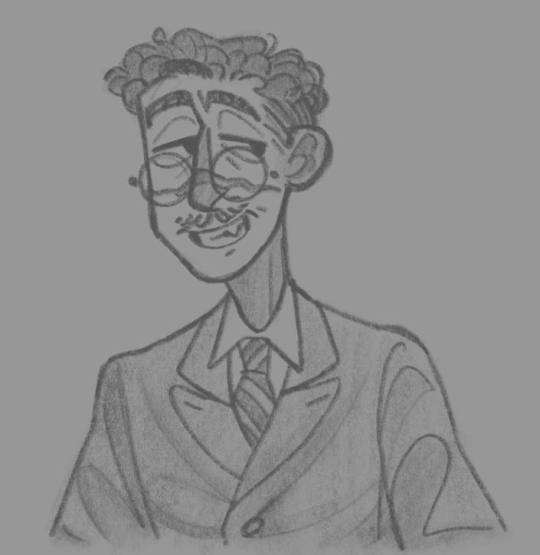
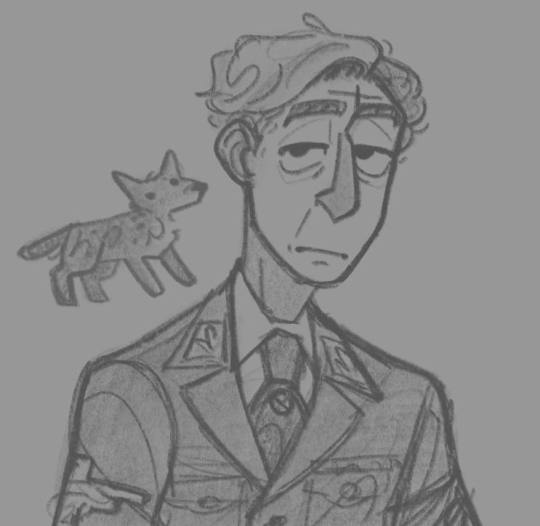
Der Sekretär ist Rudolf, ein Jude, der für die Gestapo arbeitet.
Finn ist ein SS-Sturmbannführer für die jüdische Frage.
16 notes
·
View notes
Text

Detective Quentin Lance wasn't always a supporter of vigilantes but time changes people's views. In the time Detective Lance spent in the Arrowverse we meet a couple alternative versions of the him from alternate timelines, realities and a very dark earth. But which alternative Quentin Lance did you like best?
#quentin lance#paul blackthorne#arrow#arrowverse#reset time loop how i love the angst. there will be a time loop ep poll btw.#reason I included 2007 lance and not 2010 is beacuse I make up the rules. and I felt there was a difference enough with the time mumbojumbo#dctv#dc legends of tomorrow
4 notes
·
View notes
Text

I Drew Hartmann too much that i forget i have Ocs too, so here you go
1. Sturmbannführer Hans Hoffmann (my PFP)
2. Hauptsturmführer Edgar von Brandt
3. Untersturmführer Karl Becker
4. Unterscharführer Max Neumann
5. Unterscharführer Friedrich Steiner
6. Unterscharführer Matthias Klein
7. Oberschütze Heinz Gruber
6 notes
·
View notes
Text
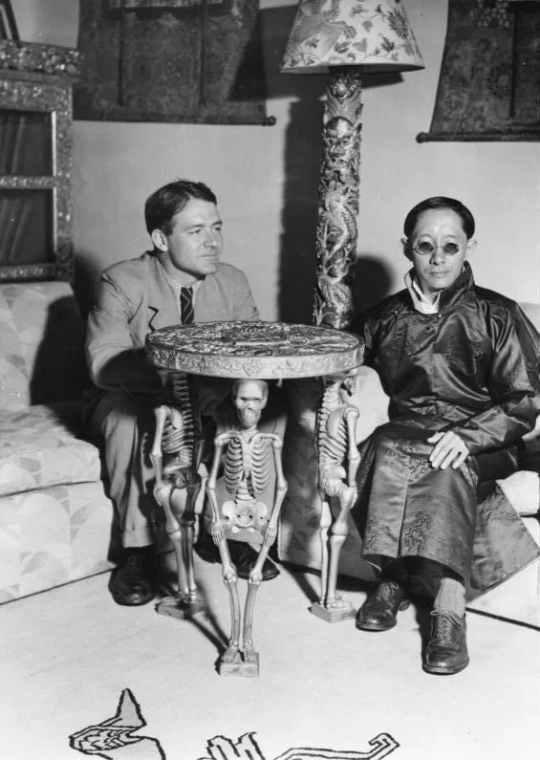
Tashi Namgyal, el Chogyal (Rey del Dharma) de Sikkim que favorecía a los británicos, se sienta a la mesa con el ornitólogo, espía y SS-Sturmbannführer Ernst Schäfer durante las expediciones alemanas al Tíbet. Junio de 1938 en Gangtok
7 notes
·
View notes
Text
Adolf Hitler congratulates Generalleutant Theo-Helmut Lieb, ᛋᛋ-Gruppenführer Herbert Otto Gille and decorated ᛋᛋ-Sturmbannführer(at the time) Leon Degrelle for escaping Russian encirclement at Cherkassy. Recorded in 1944.
8 notes
·
View notes
Text
Headcanon Major Dieter Hellstrom

1. Place where you met:
Your job at a local bakery in Paris.
The Sturmbannführer came there for another search. When he saw you, he put on his charmingly sly smile and said: "I haven't seen you here before, Fraulein."
You, despite his status, answered sternly, pointing out that he didn’t even bother to introduce himself: “Because I wasn’t here before, Herr Major..?”
The major smiled guiltily and, placing his hand on his heart, he stood at attention, knocked the heels of his boots together and said: "Excuse me, Fraulein, Sturmbannführer Dieter Hellstrom of the Gestapo. At your service. What is your name?"
You took your passport out of your dress pocket and handed it to him, saying, "Here's the document, please."
He looked at you carefully, grinned, and took the passport: "You didn't have to give me the passport. I would have taken your word for it."
You continued to look at him sternly, answering: "Well, it's your job to check documents, isn't it? Sooner or later you would have asked me for it."
He didn't answer this, but lowered his gaze, opened the passport and carefully read your name: "Francis de Marshillier. A beautiful name. Are you from Marseilles?"
"Yes, that's right," you answered clearly.
You had nothing to hide or conceal, but in the presence of a Gestapo major you would always feel as if your house was filled with something illegal.
He gave you your passport, continuing to ask questions: "How long have you been working here?"
"Almost 2 weeks, Major."
"Do you like it here? Does no one bother you?"
"I'm not complaining."
"Do you live alone or?"
("Why does he need this information?! Although... what am I talking about, they always ask out-of-the-ordinary questions.)" - she thought discontentedly.
"Almost my entire family moved to Switzerland. I live here with my Aunt Josephine. She owns the bakery." You answered honestly. There was no point in lying to him. He would have found out if he wanted to.
The major would have liked to ask something else, but a soldier who ran into the bakery turned to him:
"Sturmbannführer Helstrom, You are wanted by Hans Land."
Dieter turned towards him and quickly replied, "I'm on my way, Hermann."
The soldier disappeared from sight and the major turned back to you and said with a smile: "It was a pleasure to meet you, Fraulein de Marchilier. I hope to see you again."
He bowed to you, put on his cap and left the bakery.
You hoped that you wouldn't see him again, even though you liked him.
2. How he starts courting.
A week after meeting, he sends a gorgeous and expensive bouquet of flowers.
Your Aunt Josephine found him in front of the bakery. She was beside herself with happiness. Auntie kept saying that it was high time you got a boyfriend.
When your aunt left you alone with a bouquet of multi-colored roses, you found a note:
"Dear Fraulein de Marchilier, I would have sent the bouquet earlier, but only now have I plucked up the courage to do so. I hope you like it. Although no bouquet can compare to your beauty.
Sincerely, Major Dieter Hellstrom."
Putting the note aside, you sat on the bed, covering your face with your hands.
"What should I do?! He won't just leave me alone. I need to think of something. How to make him not like me. I didn't even show him any affection.")
>>>
After the bouquet of flowers came more expensive gifts. Valentine's Day was approaching and the major sent her a box of Belgian chocolates.
Aunt Josephine kept saying, "You've definitely caught his eye."
You: "Aunt Josephine, stop talking like that."
Josephine: "You know, Belgian chocolate is hard to come by. I'm sure he wouldn't go to all this trouble if he didn't want to please you."
3. Invites you on a date.
A week after Valentine's Day, Sturmbannführer Helstrom met you at the bakery when you were closing the premises.
At first you were scared, not immediately recognizing the man.
Dieter took off his cap and walked up to closer to you, smiled: "Hello, Fraulein de Marchilier."
You smiled awkwardly at him, "Hello, Hellstrom."
The man looked confident, but there was a subtle hint of worry in his eyes.
"A lovely evening, don't you think?" he remarked.
You agreed with him: "Yes, very much."
After a minute of silence I decided thank him for the gifts: "I want to thank you for the flowers and chocolate. I was very pleased."
The major smiled slyly. As if that's what he expected to hear.
"It's the least I could do to show you how much I admire you," he said, not hiding his charm.
You had no idea how to react to this. You felt very awkward and hard to believe. You were looking for a catch in his words. You looked at him silently, feeling the blush spread across your cheeks.
"I won't delay the moment, Fraulein, and I'll ask you straight out. Will you agree to go on a date with me?" he asked, looking into your brown eyes.
"Why?" you asked sharply. You didn't even know why you answered a question with a question. Looking down, you awkwardly began to speak: "Sorry, that was a stupid question, Major."
He smiled and patted you on the shoulder, saying, "It looks like you've never been asked out on a date before."
You looked at him silently, nodding in agreement.
The major hastened to reassure you: "Francis, I assure you that you don't need to feel awkward with me. I don't want you to be afraid of me. You're just all that's been on my mind for the past few weeks. Please go on a date with me. Otherwise, I'll have to become a regular customer at your bakery just to see you." His confession even touched you. It was unusual to learn that the major was infatuated with you.
You softened your gaze and answered him, "Very well, Major Hellstrom. I would be happy to go on a date with you." The Major smiled happily and kissed your right hand.
He walked you home, made a date for tomorrow, promising to come pick you up at five in the evening.
4. Where did he take you on a date?
Major Dieter Helstrom chose to take you to a small restaurant on the other side of town.
After dinner, he asked you to dance. You danced all evening. You had a lot of fun, because you loved dancing. The smile never left your face all evening. After the dance, the major suggested taking a short walk in the fresh air. Noticing that you were already freezing from the cold, he decided to take you home.
He opened the car door on your side and walked you to the door of the house, and then took your hands, asking: "Did you enjoy everything?"
You really had a very good time and said: "Yes, Major. I had a very good time."
Dieter leaned forward and kissed your forehead, holding the kiss. The gesture was quite unexpected for you, causing goosebumps to rise and your cheeks to turn red.
Pulling back, the man looked into your eyes, caressing your cheeks with his thumbs.
"When... when can I see you again?" you asked awkwardly.
Dieter smiled, happy that you were looking forward to meeting him again: "Starting tomorrow I'll be very busy. Important people are arriving and I have to accompany them."
You looked down sadly and, realizing that he didn’t want to see her right after their first date, you said: “Yes, I understand everything, Major.”
The major cupped your chin, forcing you to look at him, "But that doesn't mean I can't find time to see you."
You smiled softly and kissed him on the cheek before walking into the house: "Then, I will look forward to your visit, Major. Good night, Hellstrom."
Leaving him alone, Dieter touched the cheek where you left a kiss, remembering this priceless moment.
5. The First Kiss
After the date, a week passed, but the major, as promised, found some time to meet with you.
When the bell on the bakery door rang, you went behind the counter, thinking it was just another customer, but to your surprise it was Sturmbannführer Hellstrom.
You greeted him without hiding your smile: "Hellstrom, I'm so glad to see you."
The major, taking off his cap, came closer to you, giving you a bouquet of flowers: "Hello, my dear."
"As silly as it sounds, I missed you," you admitted.
The major stroked your cheek: "It's not stupid. I'm very touched, because I missed you too, Fraulein. I only dropped in to see you for a short while. Unfortunately, I'll have to be away for a long time again and not see you. This evening I'm leaving on a business trip to Munich for two weeks."
A heavy stone of melancholy settled in your heart when the man said this. You had become attached to him during this time. In a sad voice, you asked him: "Of course, I understand everything, Hellstrom. Just promise that you will write me a letter when you get to Munich. I want to know that you will be safe and sound."
The major is glad about the girl's request. Of course, he would have written her a letter anyway, but the fact that she asked him to do so gave him hope in his heart that she cared about him.
"Of course, Fraulein Francis. I promise that time will fly by and you won't have time to get bored."
Not expecting such sincerity from yourself, you said: “I’m afraid, Major Hellstrom, the thought of not seeing you for so long makes me miss you even more.”
The man literally melted from your words. He grabbed your shoulders, squeezing them gently. He leaned forward a little, so that your noses almost touched. You couldn’t take your eyes off his cold gray-blue eyes.
A few more millimeters and the kiss would have been unavoidable, but the sound of the bell on the door sounded so inopportunely. You had to move away from each other. Before leaving, the major kissed you on the forehead and said goodbye.
At that very moment you realized that you had fallen in love with the major.
>>>
As soon as the major got to Munich, he wrote you a letter, which you were waiting for impatiently. In your first lives, you wanted time to pass much faster.
During these two weeks of separation, the major somehow managed to send you flowers. The last week had passed almost unnoticed. There had been many visitors lately and she had to teach everything to the new assistant.
Tuesday started as usual, but you were able to sleep in a little longer because it was your day off. Auntie wanted you to rest and have a little fun. You just had to stop by the bakery and get some vanilla extract for the buns and then you were free.
You gave the baker the vanilla and were about to leave, when the familiar voice of a German dear to your heart sounded behind you, uttering the very same phrase when he met her: “I haven’t seen you here before, Fraulein.
You turned around and saw Dieter. Without hiding your smile, you threw yourself into his arms: "Major Hellstrom, you're finally here."
The major stroked your cheeks and kissed you on the forehead: “I’m here and I’m not going anywhere.”
The Sturmbannführer took you to a nearby restaurant. On the way, he held you by the waist the whole time. As soon as you arrived at the restaurant, the major helped you take off your coat and seat you at the table.
You ordered tea and pancakes with ham and cheese. Once again you notice how handsome he is.
The major stroked your right hand and kissed your palm: "I missed you very much, Francis. I confess, these two weeks have been insanely long."
You looked away, embarrassed.
The man let go of your hand and stood up from the table, walking over to the hanger where his leather coat was. He took something from the inside pocket of the coat,
He took something from the inside pocket of his coat and then sat back down at the table, opposite you.
"I have a small gift for you, Francis," he said, handing you a small green velvet box.
You looked at him tenderly as you took it from his hands. Opening the box, it revealed a silver bracelet with "Mon amour." (My love) engraved inside. You certainly didn't expect that.
"When I saw this bracelet, I immediately thought of you. I couldn't help but ask the jeweler to make this inscription." - the major admitted.
You were overwhelmed with mixed feelings. This man had almost captured your entire heart. You wanted to hold back your emotions so as not to be naive, but nothing worked. A smile appeared on your face by itself: "I... thank you. This is the most beautiful bracelet I have ever seen." The major took the bracelet and put it on your hand.
The man told me about his trip to Munich and that he definitely wanted to take you there.
After lunch, you were hoping to take a walk outside and enjoy the sunny spring weather, but your plans were changed by a sudden downpour.
You walked outside and Dieter used his leather coat as cover from the rain. He covered you and himself with the coat as you walked towards your house. You huddled closer to the man, holding onto him.
You had never been this close to each other before. He smelled cold and fresh, like cologne and cigarettes. All you could think about was that failed kiss in the bakery before he left.
You didn't expect it from yourself, but on impulse, you grabbed his face and kissed him on the lips, which made the major slow down, and then stop altogether. After a few seconds, you pulled away to look him in the eyes. Dieter was, to put it mildly, shocked by this. You kissed him. You did what he had dreamed of doing from the moment he met you. The Major leaned forward and kissed you. You put your arms around his neck and kissed him back. Dieter lowered his cloak and wrapped his arms around you, making your faces completely wet from the rain, but you didn't care.
The kiss was very tender and long, your heart was pounding frantically inside. Through the kiss you could feel Dieter smile as you stroked his back.
When your lungs began to burn unpleasantly from lack of air, you had to end the kiss. For a few more minutes you stared at each other.
>>>>>>
Hope you all like it!
16 notes
·
View notes
Text
Hans Weibrecht. Another name. Another face. Another example of what not to be in life.
On October 16, 1939, Weibrecht was appointed as Herbert Lange's successor as commandant of Fort VII (also known as Poznan concentration camp), one of the first concentration camps established by the SS in occupied Poland. Weibrecht led the camp, which was located near Poznan, until October 15 , 1941. Numerous Poles and Jews were murdered in Fort VII under Weibrecht's supervision. Furthermore, in October and November 1939 , so-called mentally ill people were murdered there for the first time with the help of gas as part of the first euthanasia projects of the Nazi regime.
After the beginning of the "war against the Soviet Union", Weibrecht served as Hauptsturmführer in Einsatzkommando 10 a of Einsatzgruppe D from August 10 , 1941 to April 1 , 1942 , which carried out mass shootings of Jews and other ideological opponents and undesirable persons in the territory of the Soviet Union.
On January 30, 1944 , Weibrecht was appointed Sturmbannführer. In the same year, he was transferred to the Reich Security Main Office (RSHA). From October 1944, Weibrecht was assigned to the Inspector of the Security Police and SD (IdS) in Posen and later as "Chief of the Gang Fighting Units".
And that is pretty much all there is to him. His name isn't unknown, but it mostly forgotten. A man of no importance in today's world except through generational trauma. Thus we rise above men like these. We do better. We have to.

8 notes
·
View notes
Text
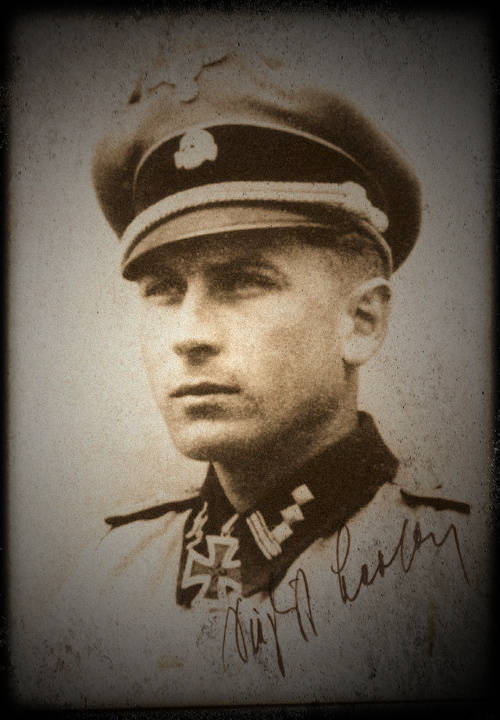
Hauptsturmführer Siegfried Brosow
( Born: December 10 , 1918 in Steinfelde in East Prussia - Died: November 18 , 2008 in Oberkotzau )
Sturmbannführer (Storm Unit Leader/Major), in the Waffen SS during World War II who was awarded the Knight's Cross of the Iron Cross. This was awarded to recognize extreme battlefield bravery or successful military leadership by Nazi Germany during World War II.
Siegfried Brosow joined the SS-VT(auxiliary) in 1937 and was issued the SS service number SS 353059. He was selected to be an officer and sent to the SS-Junkerschule at Brunswick from 1939 to 1940, while he was at the school he joined the NSDAP in December 1939 being given the party number NSDAP-Nr: 7 145 966. During the Battle of France Untersturmführer (Storm Leader/Second Lieutenatnt) Brosow was awarded the Iron Cross 2nd class for bravery and the Iron Cross 1st class, during the first assault on Moscow and was promoted to Obersturmführer (Senior Storm Leader/First Lieutenant) on 30 January 1942.
He returned to the Das Reich Pionier battalion in January 1943 as the commander of the 1st Company, until he became the commander of the Divisional staff in October 1943.
During the rebuilding of Das Reich in 1944 he became the temporary Pionier Battalion Commander and assumed full command during the Normandy Campaign. He led the Battalion until February 1945 when he was reassigned to the SS-Pionierschule as the commander of training and remained here until captured by the Russians in May 1945.
Upon his release he became a school teacher. Siegfried Brasow died on the 18 November 2008.
#Hauptsturmführer Siegfried Brosow#wwii#wwii germany#history#war#world#life#people#germany#legend#reality
5 notes
·
View notes